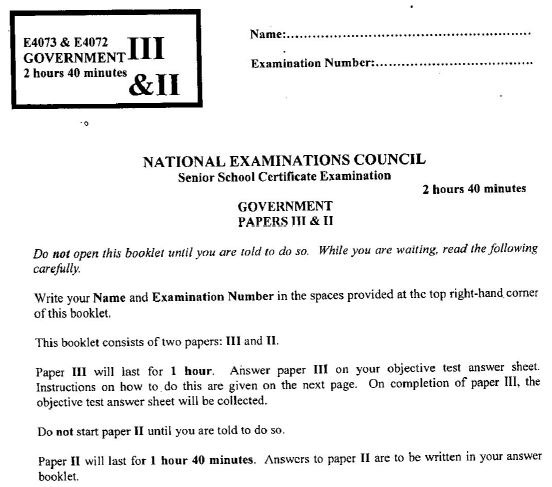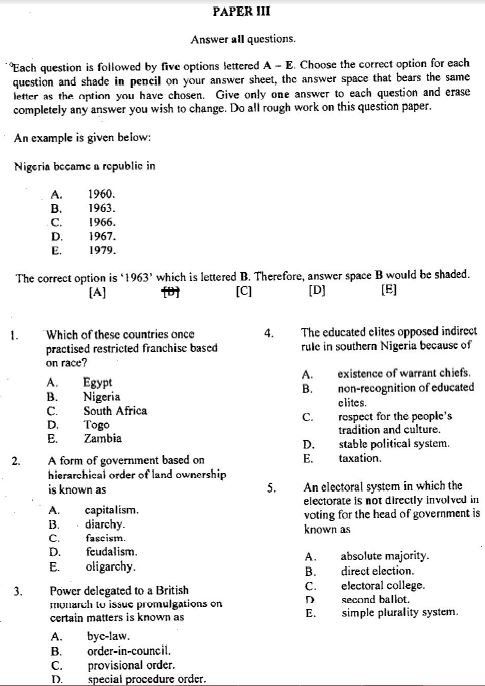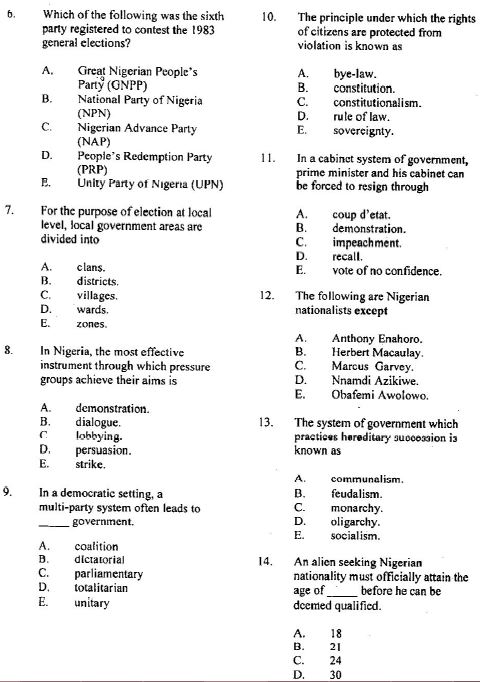2023 NECO Government Answers Released.
The Neco Government answers 2023 questions have been released. The National Examination Council (NECO) Senior School Certificate Examination for Government papers will hold on Thursday 13th July 2023 as scheduled.
The Neco government exam is for Paper III & II: Objective & Essay which will commence from 2.00 pm to 4.40 pm. In this post, we will be posting samples of the neco government questions for candidates that will participate in the examination.
See below;

See NECO Government Answer 2023.
PAPER-II (Essay)
Answer only FOUR questions in the section.
Write your answers in the answer booklet provided.
1. (a) Describe government as an academic field of study.
(b) Identify four branches of government as an academic field of study.
2. (a) Explain the concept of legitimacy.
(b) State five factors that promote legitimacy of a government.
ANS: (a) Legitimacy is the recognition and acceptance of the right/authority of a government and its institution by the people, to make and enforce laws.
(b) (i) A government popularly elected through free and fair elections;
(ii) holding of periodic elections;
(iii) adherence to the provision of the constitution of the state;
(iv) involvement and participation of the people in the management of the
affairs of the state;
(v) responsible and responsive leadership;
(vi) tolerance to opposing or divergent views;
(vii) respect for the Rule of Law;
(viii) acceptable ideology of the government;
(ix) acceptance of the government by the international community.
3. (a) What is authority?
(b) Highlight five ways by which citizens can participate in politics.
ANS: (a) Authority is the legal right to make and enforce laws that the citizens must obey.
(b) (i) By belonging to political parties;
(ii) by contesting elections;
(iii) by sponsoring political parties;
(iv) by voting in elections;
(v) by acting as party agents;
(vi) by attending political rallies;
(vii) by holding political posts;
(viii) by acting as election observers/ monitors.
4. (a) Explain political participation.
(b) State five ways a citizen can participate in the affairs of a state.
5. (a) Highlight three classes of the civil service structure.
(b) Identify three characteristics of the civil service.
6. State four achievements of Clifford’s Constitution of 1922 in Nigeria.
ANS: (i) The 1922 constitution introduced the elective principle;
(ii) it gave rise to political activities/ awareness in Nigeria;
(iii) it led to the formation of the first political party in Nigeria;
(iv) the constitution paved the way for the establishment of newspapers in Nigeria;
(v) it allowed more representation of Nigerians than the previous Nigeria Council;
(vi) it laid the foundation for constitutional developments in Nigeria;
(vii) it established a constitutional government in Nigeria as opposed to a government by statutory instruments;
(viii) it increased the tempo of nationalism in Nigeria.
7. Identify four elements of checks and balances in the pre-colonial Yoruba political system.
ANS: (i) Oyo-mesi – a Council of king-makers;
(ii) Ogboni – a secret society/ cult;
(iii) Ifa, the Oracle /Yoruba traditional priest;
(iv) occultic/ mystical calabash (Igba iwa);
(v) covenant /bond (Imule);
(vi) taboo /Prohibition/ forbidden acts;
(vii) swearing /Oath/ Vows (Ibura);
(viii) boycott or chiefs refusal to go to the chief’s palace;
(ix) revolt/ rebellion /uprisings/ demonstrations;
(x) impeachment /dethronement;
(xi) suicide.
8. Identify six problems encountered by the Economic Community of West African States (ECOWAS).
9. (a) List the four towns that made up the four Communes of the French Colonial Administration in West Africa.
(b) State any four rights enjoyed by Africans in these four Communes.
10. Highlight six factors responsible for the formation of the National Congress of British West Africa.
11.
12. (a) Identify any four past Secretaries-General of the United Nations Organizations (UNO).
(b) State any five functions of the Secretary-General of the United Nations Organization (UNO).
ANS: a. (i) Gladwyn Jebb; (ii) Trygve Lie; (iii) Dag Hammarskjold; (iv) U- Thant; (v) Kurt Waldheim; (vi) Javier Perez De Cuellar; (vii) Kofi Anan; (viii) Boutros Boutros Ghali.
(b) (i) The Secretary-General brings any matter that threatens world peace to the attention of the Security Council;
(ii) he prepares an annual report for the General Assembly;
(iii) he prepares the agenda for the meeting of the General Assembly and Security Council;
(iv) he appoints other members of staff in the Secretariat;
(v) he administers peacekeeping operations worldwide.
Neco Government Objective Questions 2023.


15.
Note: There is nothing like Neco Government Expo online. Neco Ssce candidates are to desist from patronizing online fraudsters/vendors who say they can provide such services as they are not real.
If you have any questions, endeavour to use the comment box below…

Pls I need government answer this night
Hello please I need the answer for government and literature too please
Please I need government questions and answers
Pls is dis real
No
Ineed government and literature question for 2023 neco
Wow that good pls i need government question and answeri
I need government question paper
I need the essay answer for government
I need the essay answer for government
Pls I need 2023 government question and answer
Pls I really wanna know is this actually real??😓
Please I need government and literature questions and answer for 2023
I need government questions and answer this night please
Pls biology practical
Thank you
This is not real oooooo, it is not 2023 question
Is dis real, cause am curious
I need obj
I need government questions and answers
I need government answers
I need government question and answer
Pls I need government objective and essay today pls
Good day Mr / Mrs
I Need Government Answer Today Please.
Me too pls
It will be good if you made a what’sapp group for this
I need your help today sir
Thanks and I need the answer of the objective tonight
I need the answer for obj tonight
Wassup baby paste me your whatsapp number let’s chat
thank
Pls can i get past questions app?
Is it today question
Just stay there Esther Ajayi
Don’t go and read yur book and be waiting 4 runz
I pity you!!
When did u wrote yours dat u know dey want pple to fail??
poooor
this is wrong this were not the question that came out
u guys just want people children to fail
Is this actually 2023 government question
Pls if its real drop objectives pls
Is this real…just curious
Is not….
Lo
I need your help today sir by this evening
Is this real?
Is this real?
If this is real,I need obj answer around 1:00pm please
Ok
To
I think this thing is real go and check that of WAEC you’ll see 🙊
How did you know
I don’t think it’s possible but how come you guys edit this thing like this
I don’t believe in this Sha
Has the neco Nov/Dec exam started?
It starting tomorrow
When are they starting
Is this sample questions for the government neco gce that will be commercing tomorrow?
this is fake u guys re fake people delete this site jor
No its really oooooo
Please is it today question?
Have time table for 2021 come out
pls i need government answer this night
Hi
I need objective answers in Government
Now pls nd plsoooooo